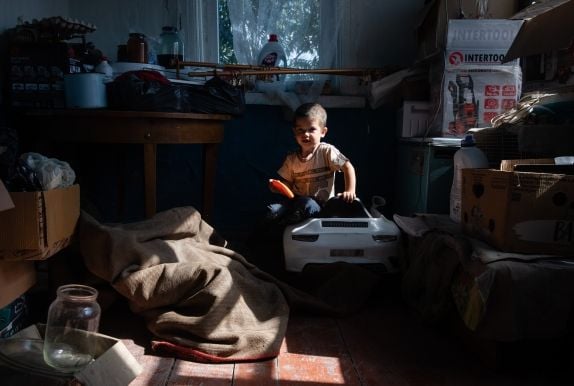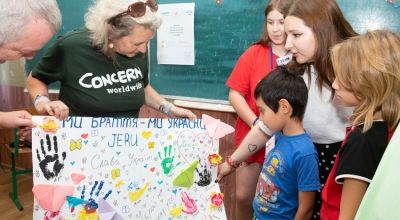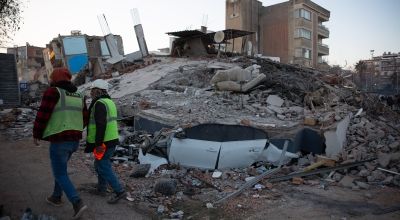
Read our 2023 annual report

Knowledge Hub
In September 2023, Danny Harvey, Concern’s Executive Director UK, visited Ukraine to meet with the partners we work with. Here, Danny tells us of her experience and how Concern is supporting communities.
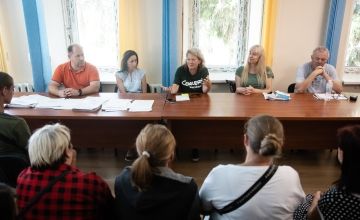
You recently got back from a trip to Ukraine. Where did you visit and what were your impressions?
We headed to Eastern Ukraine to Kharkiv oblast, and a number of areas, which had been occupied by Russia during the early days of the conflict, had come under heavy bombardment. They are now under Ukrainian control and remain a centre for people displaced from areas of heavy fighting, closer to the border with Russia.
Can you tell us a bit about the Concern programme in Ukraine? What is the focus of the work?
The Joint Emergency Response in Ukraine (JERU) is a unique collaboration between Concern Worldwide and Welthungerhilfe (WHH), a German charity with a similar mandate to Concern. JERU was set up to enable the delivery of rapid support and services to people affected by the conflict in Ukraine in places where need is greatest. Our projects include cash assistance, psychosocial support, provision of supplies and food and support to collective centres offering support to those forced to flee.
When you met with families or individuals who have been displaced by the conflict, what were they telling you? What are their biggest challenges at the moment?
Some of the biggest challenges we heard about were access to decent housing as people are moving to places further west which might also have been affected by conflict. Lesya* and her family talked to our team about using the cash payment they had accessed to repair a house they had been given to live in after moving from their village on the Russian border.
This money has been a tremendous help. Not only are we using it to repair the roof, but we've also set aside a certain amount for firewood and purchased fuel. It has also allowed me to buy medicine when the children fell ill.
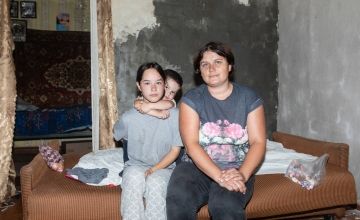
Did you meet anyone whose story stood out?
I met Suitlana Nezdimyshapka in Boromlya village in Sumy Oblast. There was shelling and destruction. Suitlana received a cash payment from JERU which she used to purchase wood for heating and medicines for the elderly people in her family. Suitlana used to work in a pharmacy which was destroyed and she hasn’t been able to find work since. She isn’t used to receiving support in this way, she has always worked and wants to find employment but in the meantime, the cash support helped her meet immediate needs for her household.
What was the most inspiring thing you saw?
Saltivka was one of the most shelled districts of Kharkiv in the first days of the conflict, with many buildings still in ruins. Not daunted by the threat of air strikes, Dariya Khneblikova from We are Brothers organised the renovation of a basement, under a building that was a nursery, to become a play centre and classroom. Despite being underground, the beautiful murals and lighting make the large room feel comfortable and they will soon be welcoming children for half day sessions. Of the 300,000 people who lived here, Dariya estimates only about 10% have returned so far but, she says, that is still a lot of kids who need somewhere safe to go to school.
Concern is providing cash payments to people. Why is cash so important in an emergency context?
Where markets are working and goods are available at an affordable price, giving families cash to meet their basic needs is hugely effective. The people I met are buying in fuel and wood for the winter now that they can’t use their gas heaters, paying for medicine and hygiene products for the family, and buying in essentials for the upcoming winter (where temperatures can drop to minus 20 degrees) such as warm clothes and bedding.
Alongside cash, Concern is providing psychosocial support sessions – what does this look like?
The psychosocial work of all the JERU partner organisations is so important to support people as they recover from trauma and deal with ongoing challenges. They are regular group sessions with both adults and children, often organised into affinity groups such as people who have been displaced for example. They are run by psychologists, although out in the rural areas we visited, local psychologists are not always available and those that provide support often travel hundreds of kilometres each week to reach all the groups they are supporting.
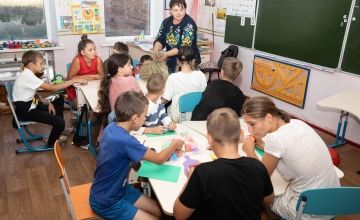
You spent some time with children who have been displaced by the conflict, how are they coping?
The reality of the conflict is embedded in day to day life in Ukraine. Air raid sirens ring out at least a couple of times each day and the conflict has had a big impact on education. Children in Kharkiv and Sumy have to learn online, which makes the psychosocial support sessions provided by our partners, Sumy Public Circle and We are Brothers so important to allow them to socialise, play and be creative. According to the psychologists I spoke to, some children are scared of loud noises and others have more deep-rooted fears which can only be explored and dealt with once trust has been established through regular sessions over a period of time. During our visit, the air raid sirens sent us all to a bunker close to the school, where after a round of the national anthem, childish exuberance took over and the kids passed the time underground playing games and winding up their teachers.
Did you find out anything unexpected on your visit or learn anything new?
Ukraine was a very special country to be in. Despite the conflict and the distances the trains were clean, cheap and punctual and there is a boundless supply of excellent coffee – with small coffee venders and great cafes everywhere we went.
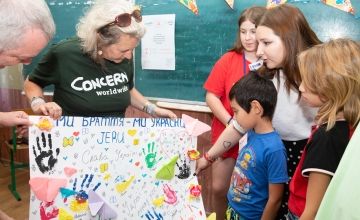
How is Concern working with local organisations/partners?
I met Sumy Public Circle, We are Brothers and Help Group. These organisations have either started since the conflict or changed and reoriented what they do, motivated to help others through challenging times. As such they cover a wide range of activities based on people’s needs and choose ways to support them that will have the most impact. For example, We are Brothers provide stoves and fuel wood while insulating houses to increase the efficiency of heating; they renovate schools and houses, shore up damaged buildings until they can be repaired; and provide meals, food kits, hygiene kits and other items to those in need. They arrange evacuations from areas under bombardment and then support people displaced by the fighting in shelters and collection centres.
Why is working in partnership so important?
The Ukrainian partner organisations are at the heart of the JERU response. Local organisations are the first responders to any crisis and will be working in communities for the long term. They understand best what local people need, how to provide support in a way that is acceptable and useful for people and can ensure the views and of communities are taken into account in deciding what to do, how to do it and importantly how to improve it.
How can people continue to support people impacted by the conflict?
The experience of occupation, bombardment and the protracted conflict has been hugely traumatic. Along with collective efforts at recovery, the arrival of aid and support from outside has been important to communities, to know that they are seen and supported.



